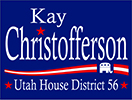Week 1 – 2016 Legislative Session
The Legislature is off to a great start as members of both the House of Representatives and Senate have rolled up their sleeves and gotten to work. In fact, with a full reading calendar meant for two days worth of work, the House was able to adjourn early after getting through every one of the bills posted.
These bills were debated, voted on and passed out of interim committees since the end of the last Legislative Session, and rather than adding to current code, many were repealing language that was confusing or unclear in the law. Every one of the bills considered and passed today came out of an interim committee with unanimous, bipartisan support and no fiscal note.
We accomplished many major reforms during the 2015 General Session and the work that our interim committees did over the past year has allowed us to start off with a momentum that should lead to another successful session. Click here to watch the full video.

Internet Sales Tax
I want to hear from you on this issue. Please read through this information and e-mail me back your thoughts on a sales tax on internet purchases.
A proposal gaining support in many states across the country is a law requiring the collection of sales tax by the merchant, at the specific tax rate where the buyer lives, for all purchases on the internet or by mail order. Marketplace fairness legislation has already passed in Colorado, Illinois, Michigan, Nevada, New Jersey, Ohio, Tennessee and Washington. Utah is among the states looking at options to reclaim the lost revenue that currently is required to be paid by the consumer, but seldom is.
Justice Kennedy has said that a previous Supreme Court decision, in Quill Corp v. North Dakota, “ . . . now harms states to a degree far greater than could have been anticipated earlier,” finding that Congress needed to act to allow state collection of the sales and use tax. Congress has failed to act, in which case it is incumbent on states, as sovereign entities, to exercise their constitutional right to act.
Under current law, sales and use tax is already required on all sales but if a Utah resident doesn’t pay the tax at the time of purchase, it must be remitted when filing their Utah income tax return. Unfortunately, few people actually do this, leading to an estimated $190 million uncollected this year. Art Laffer has estimated that Marketplace Fairness legislation would lead to the creation of 16,961 new jobs in the state and an increased state GDP of $5.2 billion by 2022.
Unless we address this issue, we can expect to see problems in adequately supporting our public universities and transportation needs, as both are partially funded through the sales tax.
Right now, over 2,700 businesses in more than 4,300 taxing jurisdictions are using free software that allows them to collect those taxes and dozens of software and web applications exist to easily, quickly and affordably calculate, collect and remit the sales tax for these online purchases.
Rep. Mike McKell will be running Marketplace Fairness legislation this year that allows the state to require online retailers who do business in Utah to comply with our tax law. It will require the State of Utah to reduce the state sales tax rate when the collection of remote sales tax begins, which will lead to revenue neutrality. The Utah Taxpayers Association has publicly declared support for a Utah solution that is revenue neutral.
This legislation will allow both businesses and consumers to more easily comply with existing law, it will extend a tax break to all — even those buying locally — and it will treat all businesses, consumers and transactions equally.


House Guests
Utah House of Representatives welcomed Congressman Chris Stewart and Congressman Rob Bishop. Congressman Stewart discussed three issues the United States faces: economic growth, national debt and national security. Click here to watch his remarks, it starts at 13 minutes. Congressman Bishop and former Utah Speaker of the House discussed public lands and military during his visit to the House. Click here to watch his remarks, it starts at 42 minutes.

Public Lands
The Commission for the Stewardship of Public Lands announced key findings from a comprehensive legal analysis performed by legal scholars and practicing attorneys from across the country. These experts conducted a rigorous objective legal analysis to determine if there are legitimate legal precedents and historical principles for the State of Utah to challenge the federal government’s permanent ownership of the majority of the land within the State. The conclusion of the legal analysis is that compelling legal basis does exist for the State of Utah to challenge federal ownership of public lands in the state. The findings identify three primary legal theories as having merit:
1. The Equal Sovereignty Principle, which mandates that the States in the U.S. Federal system be equal in sovereignty with one another.
2. The closely related Equal Footing Doctrine, which requires that States admitted to the U.S. subsequent to the 13 original colonies should receive all sovereign rights enjoyed by previously existing states in the U.S., including the right to control land within their borders.
3. The Compact Theory, which posits that Utah’s acceptance of admission into the U.S. entailed explicit and implicit promises that the federal government would “timely dispose” of public lands in Utah’s borders, as it had done with the states admitted prior to Utah.
2016 Legislative Session – Committees
I serve on the following committees in the Legislature:
- Public Utilities and Technology
- Transportation
- Natural Resources, Agriculture, and Environmental Appropriations Subcommittee – Vice-Chair
It is a pleasure to serve you in the Legislature. Please let me know which issues are important to you.
Kay
Representative Kay Christofferson
Utah House of Representatives | District 56

